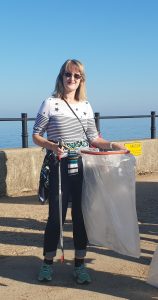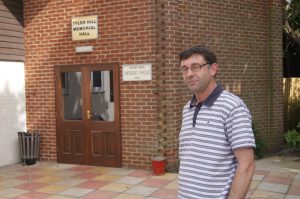 What do the local election results in Canterbury mean? With a 17 per cent shift to Labour in the county votes in the city centre, they buck the main trend in England — of seven per cent gains by the Conservatives.
What do the local election results in Canterbury mean? With a 17 per cent shift to Labour in the county votes in the city centre, they buck the main trend in England — of seven per cent gains by the Conservatives.
Local Conservatives would prefer to see them as a temporary blip. From a city perspective, it is easy to get focused on the trees (such as Canterbury issues and well-known candidates) and forget about the woods. But national issues play their part. And it could be that Canterbury — with its high academic, student and international populations — is currently a pioneer in political change. And it is not alone. In the Conservative stronghold of Worthing, for instance, Labour took five of the 13 contested seats from the Conservatives. St Albans went under Lib Dem control. On Tunbridge Wells Borough Council, the Conservatives lost their 23-year controlling majority through “key gains from Lib Dems, Labour, and Tunbridge Wells Alliance”, according to KentLive.
Looking at the English picture as a whole, former pro-EU Conservative MEP John Stevens believes that “Johnson’s loss of support in the former Conservative heartlands of the South is quite striking”. His argument is that Boris Johnson’s government will rely on tax revenues raised largely in the wealthy South to fund the expensive “levelling up” promises made to the North. But the South — particularly with its dependency on the Brexit-compromised sector of financial services — will be “less able to fund that because its economy has been damaged by Brexit”. If the analysis of Stevens — given in an interview to the Federal Trust — is correct then it is not such a surprise that our Labour anti-Brexit MP, Rosie Duffield, has succeeded in helping her local party make gains on both the Kent County Council and (through by-elections which were also held on 6 May) Canterbury City Council.
Another factor might be the number of Labour-voting Londoners moving into the Home Counties — encouraged by the lockdown-induced trend to work from home instead of commuting. Canterbury is the English city which is physically closest to the EU mainland. That might be another reason why the votes cast here were at such variance with the trends displayed across Britain in the various elections on May 6. A Lib Dem, Mike Sole, won a neighbouring seat (Canterbury South). The others in our area are Conservative. And Conservatives hold 61 of the 80 seats on Kent County Council. Labour (seven seats) takes over from the Lib Dems (six) as the official opposition. The Greens have four seats.
The Canterbury News spoke to local politicians in the four main parties represented at the polls. Three of them have been interviewed for the Canterbury News before and Keith Bothwell (a member of the Canterbury Society Committee) has written for it several times. The four are:
Mel Dawkins, elected KCC Councillor for Canterbury South, sitting Cllr on CCC
Rachel Carnac, sitting Councillor on CCC, Deputy Leader of CCC Conservatives
Dan Smith, sitting Councillor on CCC
Keith Bothwell, Green KCC candidate for Whitstable East & Herne Bay West; and CCC candidate for Swalecliffe
Their full answers are below (although Rachel Carnac decided to restrict her answers to one question). For people not wishing to read the full text, here are some highlights:
Conservative (Rachel Carnac): I’m not hearing much about Brexit. Is that because people are focused on business recovery after the pandemic and that is their priority at the moment? Or is that because it has been a pretty smooth process and very little of the widely-speculated disruption, such as to freight, markets and availability of goods, occurred? Generally, business adapts very rapidly to changes in trade.
Green (Keith Bothwell): Obviously we would have loved to win, but the numbers of votes cast for the Green Party show that we are now in the ascendency. We tripled our vote in the Swalecliffe by-election, pushing the Labour Party down into a low third place.
Lib Dem (Dan Smith): It was a great result for the Liberal Democrats in Canterbury South where Mike Sole took the seat from the Conservatives…however from a national picture this does not follow the pattern of the Conservative party doing well. For the Canterbury City South seat it was very disappointing to lose a great KCC councillor in Ida Linfield…however the loss was to Labour not to the Conservatives so it is again difficult to draw from the national context as the changes that occurred for the KCC seats were probably against the trend in both cases.
Labour (Mel Dawkins): The Labour Party results in Canterbury have been amazing and we will build on this and take the positives. From the feedback we can take the initiative to make our manifesto and policies even better and more effective. The amount of non-Conservative results added up shows that there is a strong desire for a change in the current government.
Seven Questions on the Results
Can you comment on the results your own party got in our area (putting them in context nationally, if you can)?
Labour (Mel Dawkins): Any seats gained by Labour is a positive for the party and we want to build on this result and gain more seats. The residents have shown faith in us and we want to repay it.
For me personally it was a very brief campaign, but very intense and we made the most of the time (when we could go out) to talk to residents and connect, which is really important. We have good links in the community and take part in forums, residents’ groups and organisations that deal with local issues. We have a good strong Labour team at KCC and now in Canterbury as a whole, which is fantastic.
Green (Keith Bothwell): Obviously we would have loved to win, but the numbers of votes cast for the Green Party show that we are now in the ascendency. We tripled our vote in the Swalecliffe by-election, pushing the Labour Party down into a low third place. Nationally, the Green Party has gained representation on 18 new councils for the first time, and increased the number of local councillors by 99, taking seats from Conservatives, Labour and LibDems. On Bristol City Council we won 24 seats and are now the joint largest party. It is all very encouraging and demonstrates that Green candidates can win and that a vote for Green is not a wasted vote.
Lib Dem (Dan Smith): It was a great result for the Liberal Democrats in Canterbury South where Mike Sole took the seat from the Conservatives…however from a national picture this does not follow the pattern of the Conservative party doing well. For the Canterbury City South seat it was very disappointing to lose a great KCC councillor in Ida Linfield…however the loss was to Labour not to the Conservatives so it is again difficult to draw from the national context as the changes that occurred for the KCC seats were probably against the trend in both cases.
Overall none of the main three parties locally followed the national trend…however in the broader picture the Liberal Democrats were probably closest to that trend with our continued KCC representation in the district. It was interesting to note that in the CCC Ward Seat in Swalecliffe (where we did not stand) the Green Party finished second – reflecting some support in the Whitstable area and this was reflected in the national picture.
Can you comment on the outcome of the elections in our area (putting them in context nationally, if you can)?
Green (Keith Bothwell): There have been big gains for Greens on Kent County Council, where we have quadrupled the number of Green councillors, gaining Swale East, Tonbridge (where we have two seats) and Ashford East! We now have a greater vote share than the Lib Dems on KCC. However, the first-past-the-post electoral system still means that those with a minority of votes can easily gain or retain political control. Conservatives possess 76% of the seats with only 49% of the votes. If we had a fully proportional representation system in Kent, there would now be 11 Green councillors on KCC, rather than 4.
Labour (Mel Dawkins): Our victories here are terrific, as others have been throughout the country. Other results have shown that there is more to be done. In fact, the Labour Party will always strive for better and listen to what the people have to say.
Lib Dem (Dan Smith): Election results are the views of the voting public so these votes are always feedback to be taken in to account. Covid restrictions\social distancing in the buildup to the elections were another factor that made it more difficult to engage with the public as we would prefer to do… thus the election was not entirely normal.
Do you treat these results as feedback on your and your party’s performance?
Labour (Mel Dawkins): The Labour Party results in Canterbury have been amazing and we will build on this and take the positives. From the feedback we can take the initiative to make our manifesto and policies even better and more effective. The amount of non-Conservative results added up shows that there is a strong desire for a change in the current government.
Green (Keith Bothwell): Yes of course, we always need to learn from experience in order to improve our performance next time. However, the tripling of our vote share across the county shows that concern for the environment is a big issue for everyone now and that people trust the Green Party to put it right. Many more people would vote Green if we had a proportional election system. We had an agreement with the Lib Dems — so that we were not competing against each other in one ward and one division. This paid off for them in Canterbury South and we could have won the Swalecliffe by-election with just 89 more votes. I hope that these results will persuade the Labour Party to do some strategic negotiations too, so that we do not always compete against each other. Until we have proportional representation, it is the only way that we progressive parties can defeat the Tories and elect some councillors who will work for local people. We would like to see the emergence of a Progressive Alliance in the future.
If you do treat them as feedback, what will be you doing differently as a result?
Lib Dem (Dan Smith): Rushing in to changes without fully analysing all the feedback and factors is never a good idea. Once the results have been broken down and considered by the team decisions can be taken from then based on a mutually agreed way forward. Personally I would like to see our green policies and mindset given more prominence especially with planing and construction and more generally with helping and encouraging local businesses to adapt to the changing environmental reality.
Green (Keith Bothwell): The best feedback we got was out knocking on doors, where it became apparent that people feel let down by our council. They believe most councillors are out of touch and complacent and they want action on the many environmental concerns in the district. Most people don’t have time to work out the difference between Kent County Council and Canterbury City Council; they just want something done about litter, illegal air pollution, speeding traffic and other problems. We’re going to carry on campaigning on the issues that matter to people on the doorstep and holding the council to account for its many damaging decisions.
Labour (Mel Dawkins): We need to carry on and hold firm to our strong Labour values. A fair and inclusive society, social justice, a green deal that puts the environment at the forefront, the NHS, a national care service, and social/affordable housing. We will continue to listen to what the people want and need.
In your opinion, have the people in your constituency benefitted or not so far from Brexit? Please give specific examples.
Conservative (Rachel Carnac): I’m not hearing much about Brexit. Is that because people are focused on business recovery after the pandemic and that is their priority at the moment? Or is that because it has been a pretty smooth process and very little of the widely-speculated disruption, such as to freight, markets and availability of goods, occurred? Generally, business adapts very rapidly to changes in trade. Major global dislocations were caused by the pandemic and the impact of those are being seen on commodity prices now. Companies are adapting: developing new markets, new trade routes and opportunities. It’s clearly been easier for some businesses to operate normally than for others, but if you look at the recovery in the economy, the public support for leaving the EU, and the continued strength of our financial markets, then I think it’s reasonable to say that it’s been a success. These are just my personal views. Clearly, we need to see more of the economic picture unfold as the year progresses. The key thing is to support all our businesses to recover and get back on their feet after the pandemic.
Lib Dem (Dan Smith): Brexit cannot at the moment be taken in isolation from the Covid situation, especially for Canterbury and the Coastal towns as tourism from the EU is a firm plank in the economy and this has certainly been disrupted by Covid and I suspect by Brexit (the trend pre Covid I noticed by talking to shopkeepers suggested a drop in overseas visitors to Canterbury).
Once we come out of Covid the impact of Brexit will be clearer. Where it is immediately clear is the Conservative government cut in funding for foreign aid programmes and this has resulted in reduced science funding for research done at the Universities…thereby costing skilled jobs now and in the near future…a levelling down strategy for the area. Costs for residents travelling abroad will also increase due to Brexit and this will become apparent as the holiday industry becomes more active. Insurance costs up, car costs up and much more bureaucracy for your holiday. Internet goods from the EU and vice versa have already been highlighted nationally as involving more paperwork and cost.
Green (Keith Bothwell): Firstly, we have moved beyond the political arguments around Brexit, so it is no longer an issue for discussion on the doorstop. However, it is difficult to see any benefits from Brexit. For ordinary people it is causing shortages and increases in prices of products that come from Europe, and for businesses it means a lot more red tape. Nationally it is clearly making Scottish independence more likely and, because of the difficulties caused by the new border down the Irish Sea, a united Ireland much more likely too. It is also causing friction with our European neighbours. The repercussions will continue to affect the people of Swalecliffe directly and indirectly for years to come.
Labour (Mel Dawkins): It is far too early to see the repercussions of Brexit due to Covid-19. I can see the current government blaming higher prices and tax on the pandemic, even if it eventually turns out that it was a result of Brexit. It is a fact though, that since Brexit building materials, such as sandstone and electronic components are harder to come by and have increased in price. Delivery costs from abroad have also increased. The additional paperwork for lorry drivers has seen longer queues (Brenley Roundabout off the M2) and towards Manston Airport which also increases the pollution in those areas.
We all know that Boris Johnson lies — so why have so many people still voted Conservative?*
Green (Keith Bothwell): Johnson has charisma and that often trumps substance and the truth in the short term. With time, the veneer of charm will lose its sparkle and he will be judged on his actual long-term performance. Across the district, the Conservative share of the vote actually dropped by one percent, which suggests the Conservatives are offering nothing new, whereas ours doubled, so I think it is the Green Party that is actually offering an authentic alternative vision for the district and the country.
Labour (Mel Dawkins): Yes – We all know Boris lies! It really lets down people who really want to make a difference, as it sets a bad example for what a politician is about. Brexit has been such an issue. Until we see how this has affected us, the public have given the benefit of the doubt to him. However, there has been a lot of votes that are not Conservative. Some decisions that they wish to make, are only for their benefit, not the people – such as ID cards. Also there needs to be reform in the electoral system that represents the vote more fairly and accurately. Proportional representation. In many cases Labour has the majority of the vote overall.
Lib Dem (Dan Smith): I cannot answer why people vote for proven liars. A lot do…as the USA election proved.
Anything else you would like to add?
Lib Dem (Dan Smith): Nationally from the Liberal Democrats we could have done better but we held our ground. For the ‘Country’ we now have a potentially smaller UK as the Scottish situation unfolds. Generally there are now a lot of small parties some of whom are achieving local successes (2 independents were elected to KCC).
Green (Keith Bothwell): It is easy to get into habits and continue voting the way we always have. I would ask that people think very carefully before voting next time and question whether the person and party they are voting for is best for them, and ask “is this candidate really working for my interests or their own?” We have some very serious problems to tackle locally, nationally and globally, such as poverty and the lack of jobs, pollution and litter, global heating and species extinction. We need to solve these problems with urgency and vigour … and elect the politicians who are most likely to meet that challenge.
Labour (Mel Dawkins): The NHS has done brilliantly despite the government and has given the public belief. We must make sure it is not sold off and the staff get the income that they deserve.
Scrutiny must continue into government from a local level upwards. Committees and councils cannot be dissolved, so that a pre-selected few make the decisions and limits grassroot ideas.
* Explanation of a brutal question: Some readers (not to mention Rachel Carnac) might have been offended by the brutality of this question “We all know that Boris Johnson lies — so why have so many people still voted Conservative?”.
To explain why I phrased it like that, I, the author, need to step out of the remote voice adopted for analytical articles and into a more personal one. I, Neasa MacErlean, formerly of The Observer and the Irish Press, have spent my life in journalism. It is only when confronted with dishonesty that I put questions in this form.
The reason for this is that democracy functions properly only when politicians and other leading players tell the truth. And we all know that Boris Johnson (and his mentor Donald Trump) are probably unable to differentiate truth from falsehood, or reality from propaganda. In my experience, Conservative politicians and voters know this too — hence the convoluted replies, the questions that remain unanswered and other techniques. On top of that, journalists — quite rightly — risk libel proceedings if they accuse honest people of lying. It should be deeply disturbing for the whole population that we can fearlessly call this Prime Minister a liar.
All parties have their liars, cheats and wrong-doers. Tony Blair is still reviled for the lies he told to justify the Iraq War. Former Liberal leader Jeremy Thorpe was found not guilty of conspiracy and incitement to murder but the court of public opinion did not agree.
Telling lies creates huge challenges for democracy as a whole. And that includes its five pillars — equity, representation, freedom, justice and the media. But a lie rarely stands alone. If someone lies to you they are often stealing from you as well




